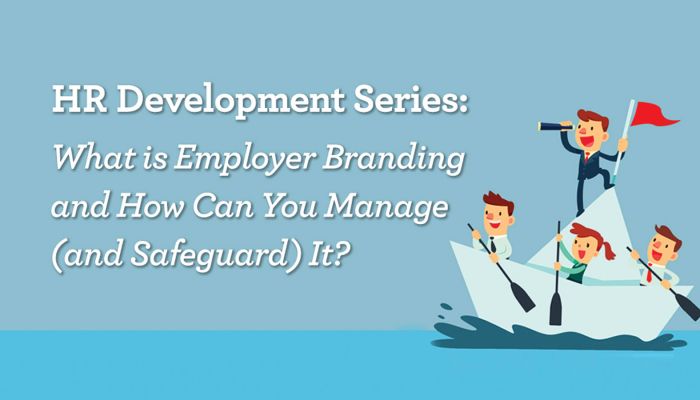What’s an employer brand? It’s not what traditionally comes to mind — Nike’s athletic shoes and “Just do it” slogan, or Subaru’s sedans and SUVs that are, apparently, the official vehicles of outdoorsy dog lovers.
An employer brand is a term coined sometime during the 1990s. It means, simply, an employer’s reputation. How the business is viewed as a place to work, how it is viewed as a good corporate citizen, how it is viewed as a business partner for vendors, and how it is viewed by its customers. Many factors go into building, or toppling, an employer’s brand (more on that later) but at its core, brand is all about perception and the reality behind it.
Employer brand wasn’t really “a thing” before the 1990s but now, most people (including our CEO Darren Kimball, writing on the HRPS blog) believe it is everything.
Let’s do a deep dive into employer brand. We’ll talk about how brand is intrinsically tied to corporate culture, how its importance cannot be overstated in this era of Glassdoor, what to do to safeguard and shore up your brand, and, perhaps more importantly, what to do with bad Glassdoor reviews or catastrophic headlines that display your company’s dirty laundry (real or manufactured) to the world.
Corporate culture and your employer brand
Your company’s culture is one of the most important components in your employer brand. Why is it so important? You only need to look at some recent headlines to understand.
This past year has been particularly brand-savaging for many companies that were formerly known for being great places to work, from Google to BuzzFeed to Tesla and more. Withering headlines told the story that these companies were actually harboring grave, toxic problems with employees because of pay equity disputes, sexual harassment, mismanagement of layoffs, CEOs tweeting themselves into big trouble, and other internal woes.
Perhaps the highest profile example of this is Google, whose 2019 annus horribilis included employee walkouts and protests because blatant sexual harassers were given golden parachutes to leave the company, accusations of retaliation against those employees who walked out, and reports of internal voices being silenced, counter to Google’s famous open culture. The fallout continued into 2020, as Google’s HR chief resigned after complaints she didn’t do enough to address employee concerns and indeed fanned the flames.

This, from the company that formerly topped nearly every Best Place to Work list known to man?
What it boils down to is, outward perception wasn’t in line with the company’s inner truth. The internal culture didn’t match what they were trying to project out to the world.
That kind of thing might have worked in another era — look at the Hollywood studio system projecting carefully crafted PR images of the happy lives of stars whose real lives were anything but. But today, with a camera and video recorder in the palms of everyone’s hands, with #MeToo giving voice to women who are mad as hell and not going to take harassment anymore, with people just sick to death of bullies and discrimination of any kind, with pay inequity creeping out from under the rock where it has lived since women stormed into the workplace generations ago — talking the talk just ain’t gonna cut it anymore. Companies need to walk the walk.
Or else, like Google, some dramatic, headline-grabbing event will happen, or like many other companies, a quieter, more stealthy assault will occur in the form of negative Glassdoor reviews. Both will cause a company’s brand to plummet.
My brand plummeted. So what?
Not every company is going to have such a public fall from grace as Google. Most companies whose brands become damaged are the recipients of bad employee reviews on sites like Glassdoor. Most everyone is familiar with Glassdoor by now, but if you’re not, it’s a site that lists information about companies and allows employees to post anonymous reviews of what it’s really like to work there.
It’s an open secret that HR pros don’t much like Glassdoor’s review platform. Recently, GetFive CEO Darren Kimball saw it for himself when he attended a meeting at Glassdoor’s headquarters in San Francisco, along with a group of HR leaders. Their frustration with Glassdoor was palpable. Many at the meeting expressed outrage about a fairly common occurrence: An employee is terminated for cause, becomes disgruntled, and posts what the company views as salacious lies about it. And Glassdoor, holding to its mandate of an open platform, lets it stand.
How big of a problem is it really? On one hand, a healthy company is going to have enough strong reviews that a few disgruntled workers shouldn’t matter all that much. But, on the other hand, even a single bad-faith review can really get under the skin of a management team committed to its mission.
Plus, it’s HR’s charge to hire top performers and that’s no easy task, especially in this wickedly competitive job market. More than a few disgruntled reviews can do real damage to HR’s hiring power, making it harder for HR to do its job. Hence the disdain.
Also, to give you an idea of the perceived importance of Glassdoor, the company that owns Indeed bought it for $1.2 billion in 2018. Post all the happy company party pics on LinkedIn you want, but those anonymous reviews on Glassdoor are where job candidates are learning what it’s really like to work at your company.
A cautionary Glassdoor tale
Consider this real-life example, real names redacted. A company handed down a round of layoffs in the worst possible way. No severance. No offboarding assistance. No dignity. It was pretty much a bloodbath. Several of the summarily-kicked-to-the-curb employees, understandably angry at their former employer and also worried about their futures, took out their frustrations on Glassdoor. The result? The company now has a 2.5 rating.
Having that low of a rating on Glassdoor is bad enough, but it doesn’t stop there. If you were to Google that company right now, you’d see a snapshot of their Glassdoor rating, front and center on the first page of your search results! Right there, for all the world to see, is their corporate scarlet letter, er, rating: 2.5.
Say you’re a highly qualified prospective employee thinking about applying for a job at that company, or say you’ve already got an interview scheduled. What’s your first move? You want to go to their website to familiarize yourself with the company, who their clients are, and everything else you can find out with a little online research. So you hop onto Google and plug in the company name. The first thing that pops up is that 2.5 rating. One trip to Glassdoor will give you the brutal details behind it. Are you still applying?

It gets worse. When abysmal Glassdoor ratings are showing up on the first page of a Google search about your company, that’s about more than hiring. When anyone who does business with you or is thinking about it — clients, prospective clients, customers, competitors, vendors — Googles your company, the first thing they find out, even before they make it to your website, is that it’s a bad place to work. The fact is, negative Glassdoor reviews reverberate. Customers see them. Vendors see them. Other employees see them. Now it’s affecting your whole business. That will do real and lasting damage.
Fixing a damaged brand
OK, so you’re looking at terrible headlines, employee unrest, or a flurry of bad Glassdoor reviews. What now? Should you take the time and trouble to do damage control, or should you simply get on with business as usual?
Here are some stats from NextWaveHire.com that might clear that up:
- Companies are overpaying on salaries by 10% if they don’t have a strong brand.
- 69% of candidates wouldn’t take a job at a bad company even if they were unemployed.
- A strong employer brand can lead to a 50% decrease in cost/hire.
- A strong employer brand can lead to a 28% increase in retention.
- 89% of HR pros agree that a strong employer brand gives you an advantage over your competition.
- A strong employer brand leads to 50% more qualified applicants.
- 92% of candidates would consider leaving their jobs if a company with an excellent corporate reputation offered them another role.
- Companies with a strong talent brand receive up to 2.5 times more applicants per job post on LinkedIn.
It’s clear that a damaged brand affects everything from hiring to retention and more.
Some companies are fighting back against those negative reviews, as reported in the Wall Street Journal last year. The article outlined how companies like Slack, Brown-Forman, SpaceX, SAP, LinkedIn, and others have had suspicious five-star spikes, some timed to make Glassdoor’s annual “Best Places to Work” list. In other words, they’re applying a heavier hand and soliciting five-star reviews from their employees. The slant of the article seemed to be that it’s a shocking, unethical practice that weakens the validity of what Glassdoor was trying to do in the first place: Paint a picture of what it’s really like to work at any given company.
Others, mainly in the HR realm, say, “Not so fast.” Glassdoor, like all of social media, seems to be a breeding ground for anonymous vitriol. Ever read the comments on the digital version of your city’s newspaper? Trust us, don’t. Glassdoor is the place where people with an ax to grind about their employers go to, well, grind it. If companies can counter that negativity with some positive employee comments, isn’t that fair?
In a word, no. We heard about Slack et al’s efforts to cook the books, so to speak. You don’t want that. Here are three better ways to handle it.
1. Deal with bad online reviews

It can seem like it’s all out of your control, employees posting reviews willy-nilly, but there are ways you can influence and enhance your company’s brand by controlling your Glassdoor narrative, even in the face of those negative reviews. The first step: If you don’t have a policy for addressing your company’s reviews, it’s time to create one.
Here are some suggestions:
Make monitoring Glassdoor part of someone’s job. It doesn’t have to be the CHRO, but somebody somewhere in the HR food chain should be hopping on Glassdoor to read those reviews, if not daily, then weekly.
Respond to all of your Glassdoor reviews, positive and negative. Glassdoor itself recommends that employers respond to each and every review, either with a thank-you or a comment about the negative review. It shows you’re engaged and listening to employee comments, positive and negative, in an effort to bolster your company’s brand.
Craft your responses to negative reviews carefully. Address the issues the reviewer raised, point out ways you’re resolving those problems, and be professional. If more than a couple of people are posting negatively about the same issue, it’s time to look at it seriously within your workplace.
Be authentic. Do not use the same cookie-cutter responses to reviews. People will spot that a mile away. Respond personally to each review.
Spellcheck! Write your responses in Word and post them from there onto Glassdoor. That way, you can use spellcheck.
Writing careful responses to Glassdoor reviews can help bolster your brand, even if those reviews are negative.
2. Fix your culture for real
That means creating the culture you want the world to see, not the one you’d rather brush under the rug. Easier said than done, right? More often than not, culture quandaries are HR’s problem to fix. So how do you fix it? A couple of places to start:
Address #MeToo issues. Create a no-tolerance policy for harassment of any kind. That includes bullying from managers and coworkers. Talk to higher-ups about the importance of pay equity. Assess the diversity of your workforce. Now is the time for HR to go to the mat if any of these issues are lurking in your workplace. Deal with them before they become headlines.
Survey employees about their ideal corporate culture. Think outside the box here and encourage people to be creative, but also practical, about what they’d love to see happening in the workplace. This is a devilishly simple way to get a big bang for your buck. You’ll be taking the pulse of people on the front lines to see how they really feel, and you’ll be involving them in the process, which is huge. Employees won’t feel like a culture shift is happening to them; they’ll feel like they made it happen.
Analyze those surveys for common themes. Is everyone miffed about the lack of flex time? Longing for half-day Fridays? What about PTO and other benefits? Do people want more interaction with supervisors or are they feeling micromanaged? These perspectives will come in handy when you make your case to the CEO about where the company culture needs the most work.
Create a forum for two-way feedback. Annual reviews are so Mad Men. Employees need to get a sense of how they’re doing, and give you a sense of how you’re doing, more often than that. Is a quarterly sit-down with direct reports out of the question?
Career pathing and management. One of the top reasons people leave an otherwise good job, according to Glassdoor, is the lack of a career path. This is HR’s wheelhouse, and can help with everything from the job satisfaction of the individual employee to the hiring and recruiting process of top talent. You need to give people a vision of the road ahead, or they’ll veer off of it to places unknown.
3. Don’t underestimate the value of outplacement after a layoff
Layoffs happen. It’s a fact of business and oftentimes it’s out of your control. But, how you handle those layoffs is decidedly in your control. Giving shell-shocked employees a place to focus their attention in the form of outplacement help, career coaching, and, in general, helping them to land on their feet is the right thing to do for the laid-off workforce, and for your remaining employees, too. They’ll get the message you really care about them.
I`m a man of 60 and my sexual life seems me very unsteady. I do not have a partner and in cases I have a partner, during the sexual act I become very nervous. Because of my nervousness my behaviour changes and the result is premature ejaculation. Totally unacceptable situation for me. Im like a young boy with lack of sexual experience. Priligy from http://www.papsociety.org/priligy-dapoxetine/ is a magic pill I discovered recently, and my life became brighter.
Giving departing employees immediate help with outplacement, career counseling, and a plan of action so they’re not twisting in the wind will help your brand, your corporate reputation, and ultimately the health of your company.
According to NextWaveHire.com, 90% of HR managers said there is a connection between offboarding and the number and severity of negative social media reviews.
Investing in the future success of your employees in transition builds greater employer trust and helps position you as an employer of choice. Your outgoing employees will be forever grateful that they were treated with dignity and provided a career transition benefit that made a real difference at a truly stressful moment. And doing so creates goodwill and trust with surviving employees, too. That’s a critical component of the process because a layoff without any sort of outplacement help creates an atmosphere of distrust and even fear around the office. The “Will I be next?” syndrome leads to good people checking their LinkedIn and Indeed sites daily.
At GetFive, we know how important outplacement is when you’re faced with a layoff. We help employer brands reach their full potential through our Active Engagement process. By ensuring that outbound employees are immediately focusing on their careers — rather than the frustrations and fears of sudden unemployment — we can help you reduce the adverse impact on your social reputation.









